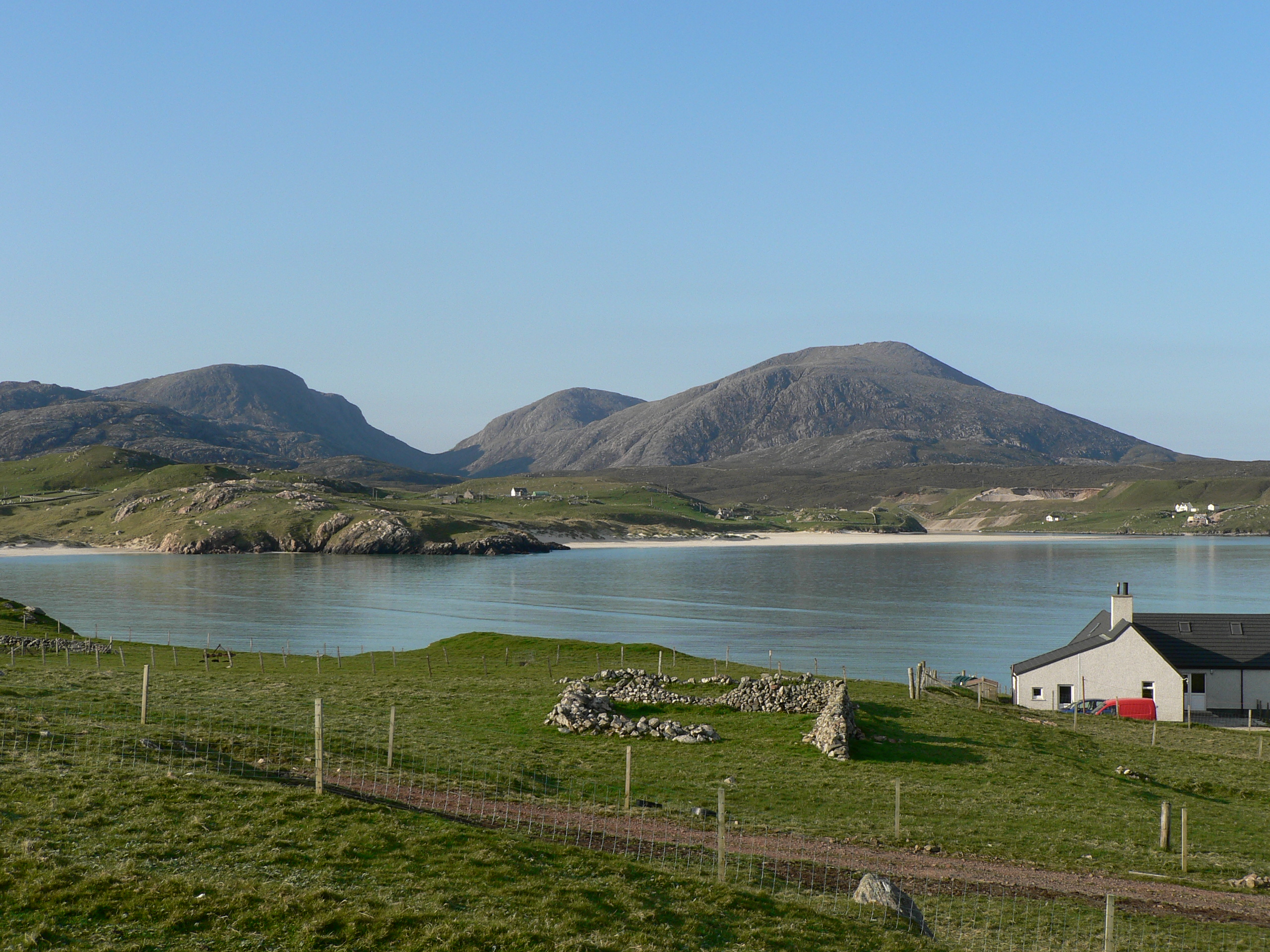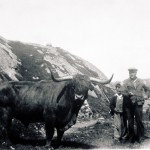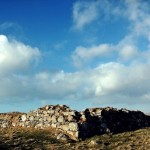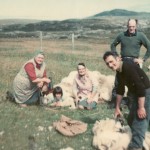Tag: crowlista
Clearances 1851
Cleidir Fank, 1975
The Stirk, the Road and the Chicken Pox
Wartime Shops, Vans and Buses
A Church in Trinidad
Bonfire Night
The Last Man of Bereiro
Murchadh Ban
Test Tubes and Hydrochloric Acid
Fishing Boats in Uig
Mealista v. Ardroil
By long and solid tradition in Uig, the spot where the Uig Chessmen were found in 1831 is held to be the Bealach Ban, a hollow in the dunes in Ardroil. In November of last year, a paper by Dr David Caldwell et al in Mediæval Archaeology proposed that, on the evidence of the Ordnance Survey Place Names book compiled by contractors from local information in the 1850s, the findspot may have been a few miles away at Mealista. Anna Mackinnon, Ardroil, wrote an initial response countering that suggestion and gives more evidence from the Place Names book here. This piece appeared earlier this month in the Uig News; thanks to Anna and the Uig News for the opportunity to republish it. Meanwhile Dr Caldwell will be speaking in Uig about the Chessmen on Thursday 4 March. Further detail will follow.
Over the last few weeks, I’ve been delving into the book of place names collected by the very first Ordnance Survey of the 1850s to find out for myself what’s actually there and to work out how much import can be given to the entry that states that the Chessmen were found in Mealista, in the ruins of Taigh nan Cailleachan Dubha. The Place Names book is easily accessible, on microfiche in the Stornoway Library.
I have to say that it’s an example of meticulous paperwork, a colossal amount of painstaking effort must have gone into its compilation but to the 21st century eye, it looks fussy and overdone. It’s handwritten and ruled out in column after column: place name; its correct spelling; any other known variation of the spelling; the location; the English “significance” i.e. translation of the name; the names of the person or persons who were the authorities for the information and of the Ordnance Survey Clerks who wrote it all down and, finally, a column for comments.
We used to be advised as students not to use it as a reliable source as the information was only as good as the knowledge of the informant and also, because its accuracy could have been compromised in translation. There’s a long time since I last looked at it and this time round, I found its main impact, apart from its painstaking “clerkery,” was the sheer volume of place names in the parish of Uig. Going through the pages nearer home, I felt as if I was meeting old friends as place names jumped out at me from the screen, names I used to hear in daily conversation, which are now rarely, if ever, aired.
I was also intrigued by the names of the local informants of the 1850s. I would really like to go back to it and list them all down to see how many can be identified with the help of the census returns. I found my great, great grandfather, Murdo Macleod, Gisla, (Murchadh Ghioslaigh) and his neighbour and brother-in-law, John Macdonald, (Iain Laghach) reeling off names. That pinpoints the collecting of place names to before 1853 and the Gisla clearance, after which all the Laghach family but two ended up in Quebec.
From memory, I was sure that the Chessmen were noted in the pages relating to the Ardroil area although the name Ardroil wasn’t in use in its present form as early as the 1850s. The farm was known initially by variations of Eadar Dha Fhadhail, such as Ederol. The entry about Chessmen is there, under the place name “Bealach Ban.” It reads, “A glen on the south side of Camus Uig, it is composed of sand. A few years back a number of carved Ivory images of horses, sheep and other animals were found in this glen. Signifies white glen or pass.”
Dr Duncan Maclennan
Transport
Quadruplets
An Iolaire Survivor
no images were found
Translated from an interview with An Geal, John Maclennan, born 1896 at 15 Kneep and married at 4 Aird, Uig. The Admiralty ship the Iolaire taking servicemen home to Lewis grounded on the Beasts of Holm outside Stornoway, on the 1st of January 1919. More than two hundred men perished. Translated by Maggie Smith.
At the end of December 1918, on leave and travelling back to Lewis with other servicemen from Uig, we planned to arrive home on New Year’s day and surprise the families. Approaching Stornoway Harbour on the Iolaire the mistake was made when we changed course. All it required was less than half a point, it just needed to be slightly to the West. The lighthouse was visible, but the man at the wheel didn’t alter the course when he should have.
We never suspected a thing until she hit, it was so quiet and everything was so normal… Only two people escaped from that part of the ship I was in. One brave man swam ashore with a rope and secured it. When the ship grounded she swung round broadside. I remember moving the rope from the stern to the side, but today I don’t quite know how I managed it. A lot of those around me had lost their mind, particularly the younger men. There were no orders from the officers maybe if… If only the ship had grounded closer to the shore, most of those aboard would have been saved. But the rocks we hit were the furthest point from the shore. Although there had been a strong wind it was behind us. I was able to crawl to safety across that rope. The ship sunk eventually and one man was left clinging to the mast until he was rescued. Only seventy five people made it to the shore.
When I got ashore I was shoeless as I had been resting and had taken them off. A lot of the men had taken their shoes off and were lying down, wherever they could get space to rest their head. Reaching the shore I fell into a bog and lost my socks, then I headed for the nearest house, where a huddle of injured people had gathered. I was injured with cuts on my chest, but I never let on to anyone. It was a frosty night and I walked from Holm to Stornoway.
Seeing a sign for the Post Office I headed in that direction. I heard a woman crying. It was Maga (nighean Seonaid Chalum Tharmoid). Maga had met two Uig men who had been on the boat, Uilleam Dubh (William Maclennan 36 Cliff) and (Tuireag) Malcolm Macritchie 7 Aird. They had mentioned I was on the ship, and as they hadn’t seen me since coming ashore, they had come to the conclusion that I too, had been lost.
Scramble for Rural Houses (1949)
“The wanderlust of the Uigeach”, from the Stornoway Gazette, 30 December 1949.
Swedish timber houses allocated to West Uig are not to be built there. Owing to the depopulation of the district there is very little chance of finding tenants. When this news was given to the Lewis District Council by the chairman, Councillor John Maciver, there was a scramble by the other districts in the island to claim the houses. The houses had originally been allocated to West Uig in the hope that they would help to arrest depopulation, but it was not likely that they would ever find tenants for twenty houses in Uig, he said.
Rather than lose the twenty houses, he thought they should try to get them for some other district in rural Lewis. He recognised the congestion around Stornoway, with people coming in to find work in the mills, but he wanted ten of the houses for Shawbost, and he understood Councillor Donald Macleod wanted ten for Point. For the last four houses at Springfield, there were over 100 applications, but only nine of these had come from outside the burgh, although the houses were intended for Point, Back and the central ward of Stornoway.
“Where do you want these houses to go?” he asked.
“I think Councillor Duncan Maciver and I have the first say in that,” said Councillor Smith, Uig. “I think they should be erected near Stornoway, and priority should be given to the people of Uig when they’re finished, as the people of Uig had been chased out of Uig by the County Council and partly by the Lewis District Council. Today we haven’t got the young men and young women left there to occupy them. If they get married they have to go and live on the mainland.”
Councillor Smith went on to say the conditions under which they had to live were a disgrace to humanity, and he made a vigorous attack on the authorities for the neglect of the road.
“It is not my fault. I did my best to get you twenty houses in Uig. It was hoped it would arrest the depopulation, but there’s always a wanderlust in the Uigeach,” said the chairman.




